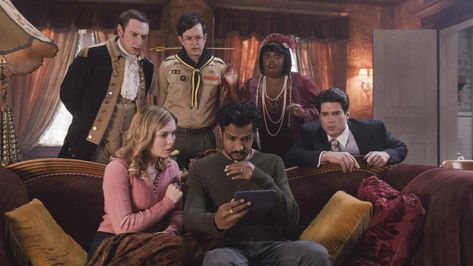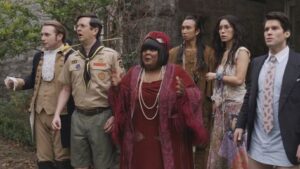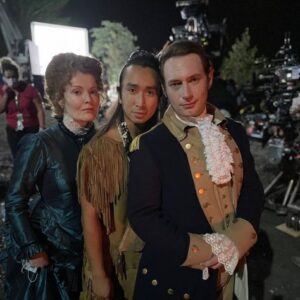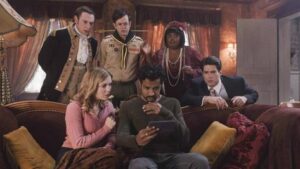
The premise of CBS’ hit comedy Ghosts is a notably ridiculous one: After a near-death experience, Sam (Rose McIver) can communicate with the spirits who haunt the country home she inherited from her great aunt — a group of specters from all walks of life and historical eras who died on the property at some point in time. One of those ghosts includes Hetty Woodstone (Rebecca Wisocky), the great-great-great-great-aunt to Sam, who maintains a stuffy, Gilded Age-era attitude that prides wealth and power and shows a disdain for modern times.

‘Ghosts,’ ‘Fire Country’ Renewed for 2024-25 at CBS
In the eighth episode of Ghosts‘ third season, however, we learn a surprising fact about Hetty that brings more depth to a character who has slowly revealed herself to be more than just an uptight robber baroness from a far-off generation. Unhappily married to a devious man of means, she is pinned into a corner when her husband’s business affairs make her a criminal target. Pushed into a corner — and thinking her death would save her wealth for her son, Thomas — Hetty commits suicide, using the cord from her newly acquired telephone to hang herself.
That reveal comes when she realizes that the cord, still wrapped around her neck and hidden by a high Victorian-era collar, can be put to good use in order to rescue fellow ghost Flower (a perpetually high hippie played by Sheila Carrasco) from a doomed eternity trapped in an abandoned well. But in the grand tradition of sitcom comedy, this touching and sensitive moment isn’t used merely as a clever plot twist, but rather offers a extremely human look at a character whose mental health suffered during an era in which there was no one to turn to for help.
Wisocky spoke to The Hollywood Reporter about how she first learned about her character’s backstory, the pride she feels for Ghosts‘ treatment of serious subject matter amid broad comedy, and why the sitcom’s premise rewards its writers efforts to play a long game with its cast of characters.

Rebecca Wisocky as Hetty, Rose McIver as Samantha and Brandon Scott Jones as Isaac in Ghosts. BERTRAND CALMEAU/CBS
When did you first find out what the writers had in store in terms of revealing this part of Hetty’s backstory?
They’ve done some last-minute surprises on us in the past, and this one [came] about a month before we shot the episode. [Creators] Joe Port and Joe Wiseman came to me and said, “We think that this is the direction that makes sense to go in with this.” And I was blown away, I was not at all expecting it. But they’re so smart and were so generous to involve me, on a dramaturgical level and sensitivity level, to make sure that things felt like they jived with Hetty’s motivations and what was plausible and accurate. And also, that we tackled this subject matter with the sensitivity that it deserves. We’re on a half-hour sitcom, but it’s become known for tackling difficult challenging topics and opening up conversations. I’m really proud of that.
Can you tell me more about those conversations, about pulling this off effectively and sensitively?

I love the way they wanted to tie it easily into the storyline [about rescuing Flower from the well]. There’s so many beautiful little seeds that have been set up throughout the first three seasons [about] why Hetty is so terrified of being alone — things that I wasn’t even aware that they were picking up on. Like, I always have made the choice to stand very close to other people or have a hand or an arm around someone. She enjoys that; she’s very orderly and standoffish, but she really has a terror of being alone. For them to explore, after 150 years of close friendship with these ghosts, she’s going to reveal the secret to save Flower from being doomed to an eternity of abandonment and aloneness.… It just was very moving to me. I mean, the episode’s title is right on the nose: “Holes Are Bad.” It’s a really beautiful metaphor.
Hetty possibly only recently put all the pieces together for herself. There’s a moment of heavy processing, where she thinks that the right thing that could have helped her was to talk to someone — but she didn’t know what that meant [at that time]. People weren’t necessarily going to therapy as we know it. Those things weren’t available to her. And then in that same moment, when she says I didn’t even know that that telephone could dial out, I just thought it was so heartbreaking. And that’s the kind of humor I’m interested in: a deep truth into someone’s blindness. She killed herself by the very means with which she could have saved herself.
